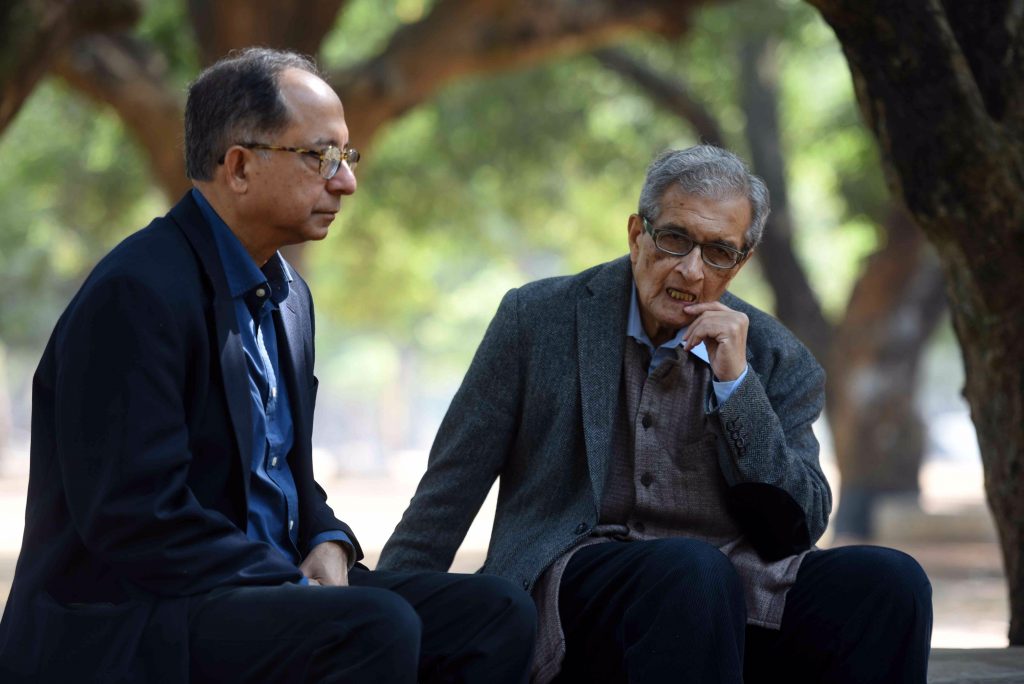The Argumentative Indian tries to bring the great man, Amartya Sen, across to reach the layman who knows the name, the face and the greatness attached to him but does not understand the complexities of Welfare Economics and Social Welfare Theory that fetched him the Nobel Prize in Economic Sciences in 1998. Perhaps it has been easier for filmmaker Dr Suman Ghosh to make the film than it would have been for a normal filmmaker because Dr Ghosh is an economist himself who teaches at the Florida Atlantic University.
Ghosh effectively blends the personal evolution of Amartya Sen and his theories as an Economist and Philosopher fluidly in a manner that one can relate to Sen’s evolution and teachings and carry something home to ponder over, to wonder about and to be influenced by. The film, traces his early boyhood in Manikganj in Bangladesh with his shift to Dhaka ,where his father was a professor, and then to Santiniketan where he lived with his mother and maternal grandfather, Acharya Kshitimohan Sen, a close associate of Rabindranath Tagore. The film is held by the thread of two interviews conducted by famous economist and former student of Sen, Dr. Kaushik Basu, Professor of Economics at Cornell University and Chief Economic Advisor to the Ministry of Finance, Government of India, filled with complex technical comments on Economics with a 15-year gap between the two conversations. The intercutting, often showing Sen writing several formulae on a black board to explain some of them to his students, may sound obtuse to most of us but they do offer us a glimpse into the mind of this genius.
The film shows eminent Nobel Laureates like the late Professor Paul Samuelson speaking into the camera alongside Nobel Laureate Kenneth J Arrow and Timothy Scanlon, Professor, Harvard University talking about Sen into the camera. Among others interviewed are Dhiresh Bhattacharya, Sen’s professor at Presidency College, Professor Sugata Bose, Gardiner Professor of Oceanic History and Affairs at Harvard who teaches a course with the Nobel Laureate and Sen’s late mother, then 92 when the first film was made, who is quoted by Sen as saying that she did not believe him when he called up to inform her that he had won the Nobel Prize! Former Indian Prime Minister Manmohan Singh says, “He is a puzzle to me.” while Dhiresh Bhattacharya elaborates, “Presidency College played a minimal part in his winning the Nobel Prize. Cambridge gave him a different language, a different way of thinking and a different approach to the subject.”
The camera (Shirsha Ray, Slawomir Grundberg, Jason Longo) scans the vast geographical canvas of Sen’s world opening with his teaching a class at a University abroad, panning to capture the statue of Mahatma Gandhi, through the open fields of Santiniketan touching two little boys running across the fields, to the Ashrama at Santiniketan and across the murals on the walls to a brief glimpse into Pratichi. There are scenes of College Street along Presidency College, shots of Sen walking down the green fields of Trinity College near Cam Lake, Cambridge as the camera meanders across figures of Alfred Lord Tennyson, Francis Bacon and so on, capturing the essence of his nostalgic account of the beginning of his stint as Master at Trinity College which he served from 1998 to 2004. The film also has touches of his sense of dry, British humor while the humility of this great mind takes the viewer by surprise. The music is kept deliberately low-key and offers a sound backdrop to what is happening within the film and what the subject is doing.
The most shocking revelation the film makes is Sen’s nostalgic but very objective detailing of his battle with cancer at the tender age of 18 when he was in college. “I detected a swelling in my mouth, a nodule in my palette, which the first doctor I went to could not detect. The experts at Medical College Hospital advised that it be cut off immediately, which I did not listen to. A medical student who was my hostel room-mate said it might be carcinoma. I began to read up and diagnosed my condition precisely as proved soon after in a biopsy conducted at the Chittaranjan Cancer Hospital. This self-diagnosis was very important for me. It opened up the possibilities inherent in the process of reading. I had diagnosed my illness only on the basis of my reading. I was seeing myself more as an agent than as a patient. For one year, I had to undergo radiation. It was unknown then because the Hiroshima bombing was just eight years old and few were aware of the effects of radiation then. It was a time for reviewing one’s vanity. It was a challenge I had to face. I had a kind of aggressiveness about it which was important for me,” says Sen. He was given five years to live and with 49 years gone (when the film was made in 2002), he is still alive. He adds that he went through depression during the illness because it cost him a year’s loss in academics. His mother (since deceased) said that as she was a believer while her son was not, she left everything to God.
While providing a fascinating journey into Sen’s mind, this viewer, however, felt the lack of an insight into Sen as a husband and father though, there are ample references to his close bonding with his mother and with Santiniketan. This is a common truth that applies to most biopics of great personalities. Does this mean that their greatness in a given field subsumes the basic human being as husband, father, brother and so on? One would think not.
English, Documentary, Color


